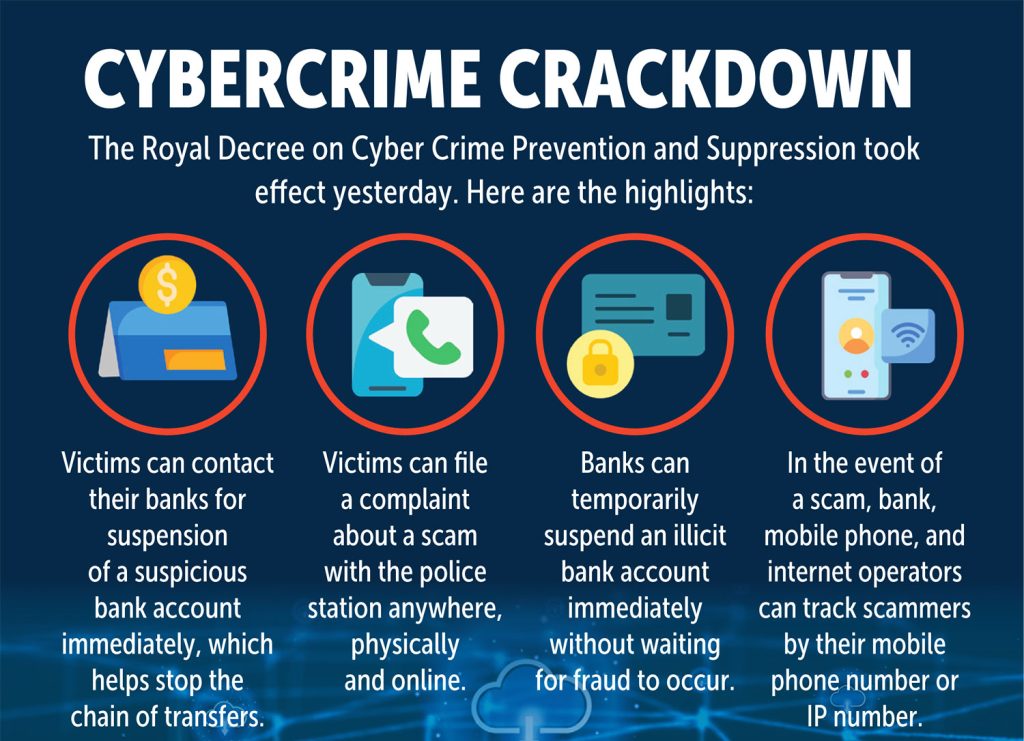News
Alerts Raised as Thailand Cybercrime Hits US$2.5Million Per Day

According to the Stock Exchange of Thailand’s (SET) Research Department, cybercrime are predicted to cause around US$22.8 billion in harm per day to victims worldwide this year, with US$2,5 million per day being realised in Thailand.
Thailand had 21 million internet users at the beginning of 2023, accounting for 85.3% of the entire population. This exceeds the global average of 64.4%.
Thais spend an average of seven hours per day on the internet, placing them among the top ten in the world.
Thais also use their smartphones to complete online transactions, allowing them to quickly explore cyberspace. However, as cyberthreats become more prevalent, this opens the door for hackers if they are not adequately cautious when completing such transactions, according to the agency.
The global cost of cyberthreats continues to rise. It is anticipated that the cost of cyberthreats would reach up to $8 trillion by 2023, prompting governments around the world to understand the need of managing cyberthreats.
This is consistent with a survey from last year’s World Economic Forum, which indicated that 95% of company leaders believe cybersecurity is a top priority. Indeed, cybersecurity should be addressed as part of a risk management plan for an organisation.
Cybercrime is unquestionably on the rise in Thailand. Over a one-year period, there were 218,210 online complaints concerning cybercrime threats, with a total damage worth of $930 million, or $2,5 million each day.
The majority of this damage was done on a personal level in cases involving contact centre gangs.
Suits arising from online purchases of products or services but failing to receive them, loan shark applications, Ponzi scams, and investment fraud are also on the rise.
According to a report by the National Cyber Security Agency (NCSA), 551 cyberthreat incidents occurred between October 1, 2021 and September 30, 2022, with two out of every three cases involving attacks on government and other important agencies’ websites.
The majority of the targets were educational and public health organisations. Private businesses were also impacted. Situations resulting in data leakage or obstructing access to information or work systems are examples. In certain circumstances, it takes a long time to resolve the issue, which has far-reaching consequences.
The SET recommends that all sectors be aware of cyberthreats and collaborate to prevent them. Be aware that no investment produces an inflated return, according to the department.
Investors should confirm information with the appropriate authorities directly. Be cautious; do not hurry into an investment or transaction without first exercising proper caution. These precautions would help lower the likelihood of being a victim of a cyberthreat, according to the report.
Cybercrime in Thailand
Thailand, like many other countries, faces challenges related to cybercrime. Some common types of cybercrime that have been reported in Thailand include:
- Phishing and Online Scams: Cybercriminals use deceptive emails, websites, or messages to trick individuals into revealing personal information, such as passwords, credit card details, or bank account numbers.
- Ransomware Attacks: In these attacks, cybercriminals encrypt a victim’s data and demand a ransom payment in exchange for providing the decryption key. Ransomware can affect individuals, businesses, and even government organizations.
- Online Fraud: Cybercriminals engage in various forms of online fraud, such as online shopping fraud, investment scams, and fake charity schemes.
- Data Breaches: Hackers may target databases or websites to steal sensitive information, including personal data, financial records, and intellectual property.
- Cyberbullying: Like in other countries, cyberbullying is also a concern in Thailand, with social media platforms and other online channels used to harass or harm individuals.
- Child Exploitation: Thailand has had issues with online child exploitation, including the production, distribution, and possession of child pornography.
The Thai government has taken several measures to combat cybercrime and strengthen cybersecurity within the country. They have enacted laws and regulations to address various forms of cybercriminal activity and promote online safety. Additionally, the Thai police and cybersecurity agencies have worked to enhance their capabilities to investigate and respond to cybercrime incidents.
However, the cyber threat landscape is constantly evolving, and cybercriminals continue to find new ways to exploit vulnerabilities. As such, it’s important for individuals, businesses, and the government to stay vigilant, educate themselves about potential risks, and employ cybersecurity best practices to mitigate the impact of cybercrime in Thailand or any other country.
For the most current and specific information on cybercrime in Thailand, it’s best to refer to up-to-date sources from law enforcement agencies, government websites, or reputable news outlets.































